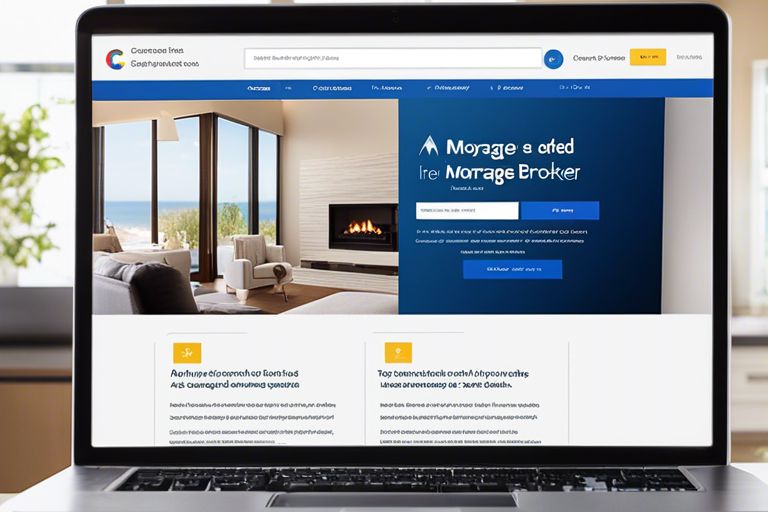Google Ads can be a powerful tool for mortgage brokers looking to boost their online presence and generate quality leads. In this blog post, we will discuss key strategies that can help mortgage brokers maximize the potential of Google Ads and drive success in their digital marketing efforts. By implementing these tips and tricks, mortgage brokers can optimize their Google Ads campaigns to reach their target audience effectively and stay ahead of the competition in the competitive mortgage industry.
Key Takeaways:
- Content Relevance is Key: Ensure that your ad content is relevant and tailored to your target audience in order to increase click-through rates and conversions.
- Utilize Keywords Effectively: Conduct thorough keyword research and use long-tail keywords to reach potential clients who are actively searching for mortgage services.
- Optimize Landing Pages: Create optimized landing pages that are user-friendly and provide valuable information to visitors, leading to better lead generation and ultimately, more conversions.
1. Understand your target audience for effective ad targeting.
2. Use compelling ad copy to capture leads’ attention.
3. Utilize ad extensions to enhance your ads further.
4. Implement location targeting for local market relevance.
5. Continuously optimize ads based on performance data.
6. Test different ad variations to find the most effective.
Crafting a Winning Campaign
Identifying Your Target Audience
For mortgage brokers looking to optimize their Google Ads campaigns, it is crucial to first identify their target audience. Understanding the demographics, interests, and online behavior of potential clients is key to creating ads that resonate with the right individuals.
Keyword Research and Selection
With keyword research and selection, mortgage brokers can strategically choose terms and phrases that potential clients are searching for online. By incorporating relevant keywords into their ads, brokers can increase the visibility of their campaigns and attract qualified leads.
This process involves using tools like Google Keyword Planner to discover popular search terms related to mortgages, refinancing, and home loans. Brokers should focus on long-tail keywords that are specific to their services and geographic location to maximize the effectiveness of their ads.
Ad Creation and Optimization
Writing Compelling Ad Copy
Any successful Google Ads campaign starts with compelling ad copy that grabs the attention of your target audience. Focus on using strong call-to-actions, highlighting unique selling points, and including relevant keywords to increase click-through rates. Make sure your ad copy is clear, concise, and provides a solution to the users’ needs.
Utilizing Ad Extensions
Writing compelling ad copy is just the beginning; utilizing ad extensions can take your ads to the next level. By incorporating various ad extensions such as callouts, site links, and structured snippets, you can provide additional information to potential clients. This not only increases the visibility of your ads but also enhances the overall ad experience for users.
This will help improve your ad’s performance and ensure that you are making the most out of your Google Ads budget. Experiment with different ad extensions to see which ones resonate best with your audience and drive the most conversions.

Budgeting and Bidding Strategies
All mortgage brokers looking to optimize their Google Ads campaigns should pay attention to budgeting and bidding strategies. These are vital components that can make or break the success of your advertising efforts. David Miles on LinkedIn provides valuable insights on this topic, offering tips and best practices for mortgage brokers seeking to enhance their online presence David Miles on LinkedIn: Google Ads for Mortgage Brokers ….
Setting and Managing Your Budget
To ensure that your Google Ads campaigns deliver optimal results, it is crucial to set a realistic budget that aligns with your business goals. Constantly monitor and adjust your budget based on the performance of your ads. By regularly analyzing the data and making necessary tweaks, you can maximize the effectiveness of your advertising spend.
Bidding Options for Maximum ROI
Managing your bidding options effectively is key to achieving maximum return on investment. Options such as manual CPC bidding, target CPA, or enhanced cost-per-click can help you optimize your bids for better results. Understanding the intricacies of each bidding option and experimenting with different strategies can help you find the right approach that suits your specific campaign goals and budget.
Monitoring and Tweaking Your Ads
Analyzing Campaign Performance
For mortgage brokers utilizing Google Ads, analyzing campaign performance is crucial to the success of your advertising efforts. By closely monitoring key metrics such as click-through rates, conversion rates, and cost per acquisition, you can quickly identify what is working well and what may need adjustment in your campaigns.
A/B Testing and Continuous Improvement
To ensure the effectiveness of your Google Ads campaigns, implementing A/B testing is important. This strategy involves creating different versions of your ads to see which one performs better. By continuously testing and fine-tuning your ads based on the results, you can optimize your campaigns for better ROI and results.
Analyzing the data from your A/B tests allows you to make informed decisions on how to improve your ads further. By testing different elements such as ad copy, images, and calls to action, you can refine your campaigns to drive more traffic and conversions for your mortgage brokerage business.
Leveraging Local SEO and Google My Business
Optimizing for Local Searches
Your mortgage brokerage’s visibility in local searches is crucial for attracting potential customers. To optimize for local searches, ensure your website includes relevant keywords with local intent, such as “mortgage broker near me” or “best mortgage rates in [your city].” Additionally, claim and verify your Google My Business listing, as it plays a significant role in local search rankings. Encourage satisfied clients to leave positive reviews to further enhance your credibility and ranking in local search results.
Integrating Google My Business with Ads
One effective strategy to boost your Google Ads performance is by integrating Google My Business with your ad campaigns. By linking your Google My Business account to your Google Ads account, you can access location extensions that display your business address, phone number, and a map marker alongside your ads. This integration not only enhances your ad’s visibility but also builds trust with potential customers by providing easy access to necessary contact information.
Integrating Google My Business with your Google Ads campaigns can also improve your ad’s performance by increasing ad relevancy, especially for users searching with local intent. By leveraging the power of both platforms, you can maximize your reach, drive more qualified leads, and ultimately, boost your mortgage brokerage’s success in the competitive digital landscape.

Compliance and Best Practices
Not staying compliant with mortgage advertising regulations can lead to serious consequences for mortgage brokers. To ensure you understand the rules and regulations, it is crucial to follow the guidelines provided by regulatory bodies. For more insights on mortgage advertising regulations, check out Mortgage Broker Marketing with Google Ads – Gold Lion Tech.
Understanding Mortgage Advertising Regulations
Any mortgage broker engaging in advertising must comply with specific regulations set forth by governing bodies to ensure transparency and protect consumers. Clear disclosures of terms, rates, and any potential risks are crucial when promoting mortgage services to the public.
Maintaining Ethical Advertising Standards
To build trust and credibility in the mortgage industry, mortgage brokers must uphold ethical advertising standards. This includes accurately representing products and services, avoiding misleading claims, and providing clear and transparent information to potential clients. Adhering to ethical standards not only safeguards your reputation but also fosters long-term relationships with customers.
As a mortgage broker, it is imperative to prioritize ethical advertising practices to ensure compliance with regulations and build a positive reputation in the industry. Maintaining transparency, honesty, and integrity in your advertising efforts not only benefits your business but also establishes trust with your target audience.
To wrap up
With this in mind, implementing effective Google Ads strategies can significantly boost the success of mortgage brokers in reaching their target audience and generating quality leads. By focusing on keywords, ad extensions, targeting techniques, and tracking metrics, mortgage brokers can optimize their Google Ads campaigns to drive more traffic and conversions. Consistent monitoring, testing, and refining of ads are crucial for staying ahead of the competition and adapting to changes in the market. By following the secrets to success outlined in this guide, mortgage brokers can achieve their business goals and stand out in a highly competitive industry.
FAQ
Q: What are some key strategies for success in Google Ads for mortgage brokers?
A: To succeed in Google Ads as a mortgage broker, it is vital to target specific keywords related to mortgage services, create compelling ad copy that highlights unique selling points, and optimize landing pages for conversions.
Q: How can mortgage brokers effectively track the performance of their Google Ads campaigns?
A: Mortgage brokers can track the performance of their Google Ads campaigns by using conversion tracking to measure leads and sales, analyzing click-through rates and conversion rates, and utilizing Google Analytics to gain insights into user behavior on their website.
What are some common mistakes to avoid when running Google Ads campaigns as a mortgage broker?
A: Some common mistakes to avoid when running Google Ads campaigns as a mortgage broker include targeting broad keywords that are too competitive, neglecting to optimize ad extensions for increased visibility, and failing to regularly monitor and adjust bids to maximize ROI.



